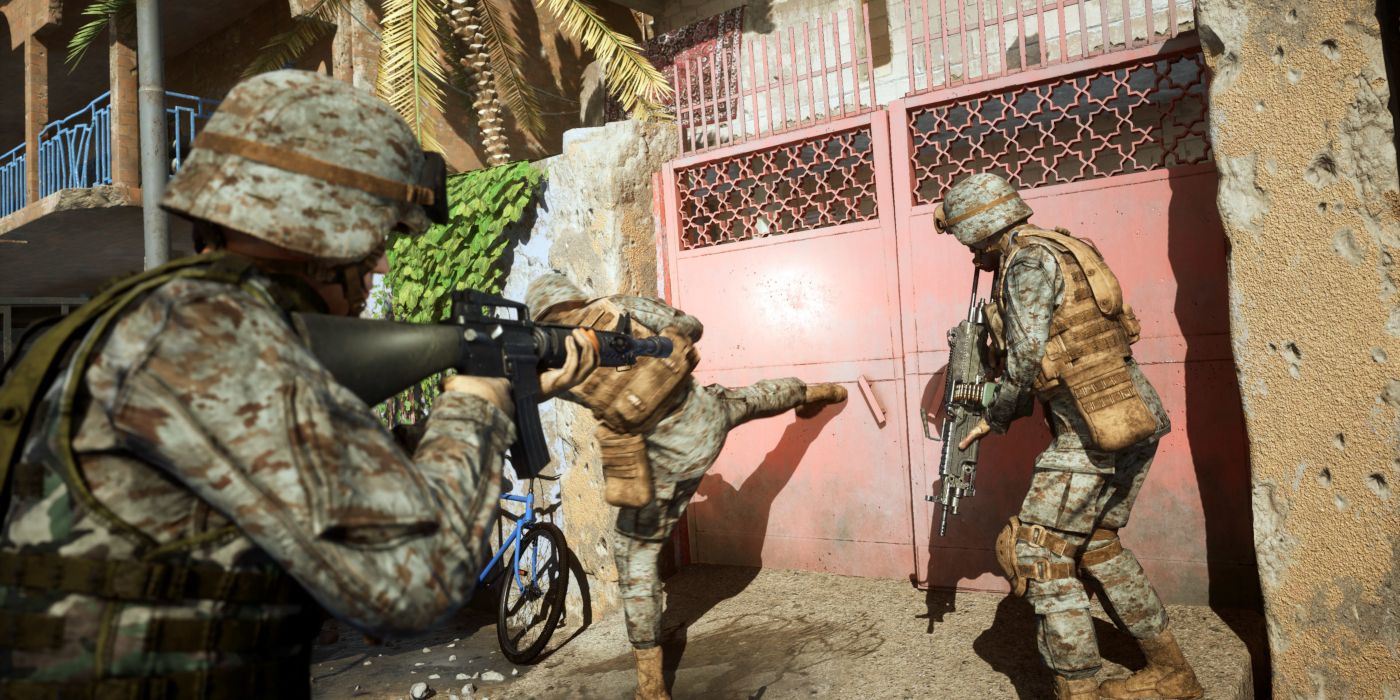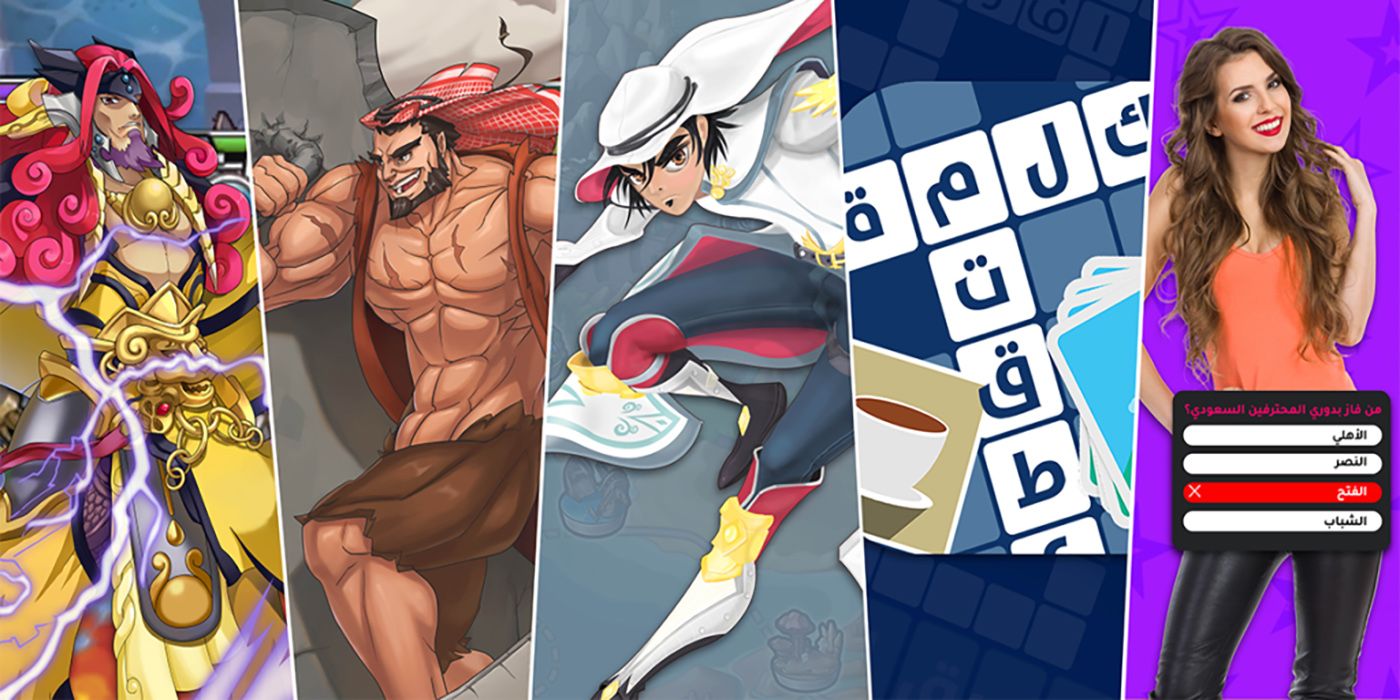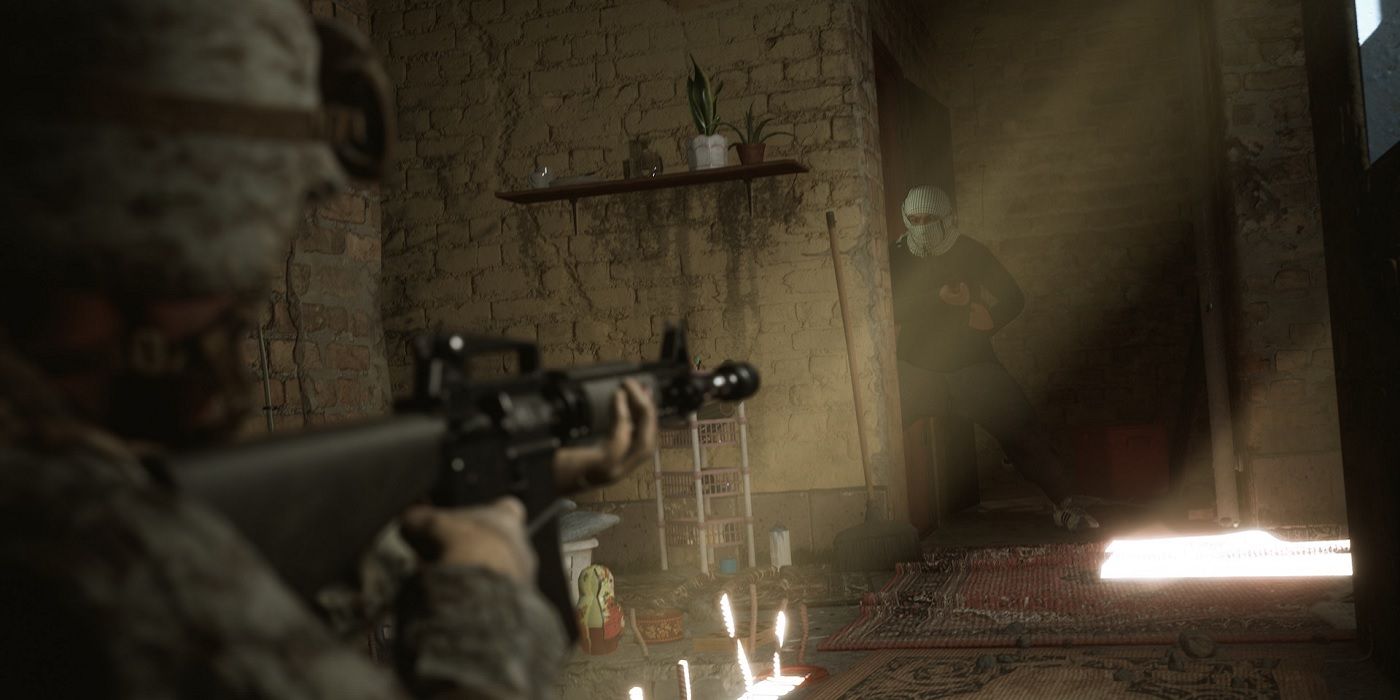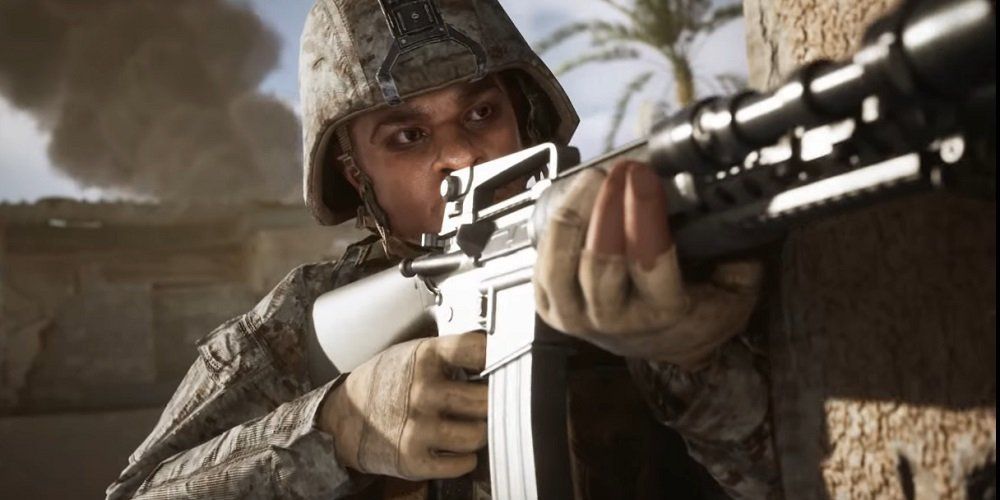
Falafel Games was founded back in 2010 by Vince Ghossoub and Radwan Kasmiya, eventually growing to become one of the top innovators in the Middle East for game development. Game Rant recently spoke with CEO Ghossoub about video game development in the region, as well as his opinion regarding the controversial Six Days in Fallujah.
For those who may be unaware, Six Days in Fallujah is an upcoming video game based on a battle in the titular city. Because of its real-world ties, as well as the past experience of the CEO with the FBI and CIA, many have called on Six Days in Fallujah to be banned. The following interview has been edited for clarity and brevity.
RELATED: The Controversy Behind Six Days in Fallujah Explained
How would you describe game development for the Middle East now vs. 10 years ago?
It's a bit better, but still under indexing in terms of capabilities and/or performance on a global scale. But, a bit better, some communities formed, some companies became successful compared to 10 years ago. It's very fragmented. There's many countries in the Middle East to start with, many small countries too. It's also diverse. I'd say also it's mainly focused on mobile, mobile being the largest market in terms of dollar consumption and users.
Since its formation, Falafel Games has become known as one of the most innovative studios of middle eastern game development. Specifically, for your studio, can you discuss some of your triumphs, an challenges you've overcome?
I think the challenges and breakthroughs we've had are, to be honest, typical to challenges and breakthrough of any game studio. We've had ups and downs. Game business is a tough business. On the long term, it's rewarding. We've been in it on the long term. We've had our challenges in being able to put together teams, we've had our challenges in terms of being able to raise capital when needed or capital that understands games—not that there's lack of capital, there's just lack of capital that understands games. We've had our challenges just related to the development of the games industry.
Us, specifically, having started as a web game developer and moved on to mobile first, the dynamics of these two markets are very different, so we've had to adapt. Web game can be segmented to a certain degree by regions, at least if you define the market by the way the users access the game. Opposed to mobile, it's much more global, one global arena of competition where everybody accesses games from a mobile or play store.
Over the years, we've had the privilege and curse of somehow innovating. Being an innovator is good and bad, I guess. Specifically, we were the first to develop strategy games, cross-platform on web and iOS. Back then, it was quite the innovation. We've had the first RPG drawn from Arab conquest history, very faithful actually to the high fidelity to actual historical records. We've had the first live-video multiplayer platform, which is something that is still being experimented upon everywhere. Some of these initiatives failed spectacularly, and some found success miraculously. I guess it's the story of almost any game studio.

What other studios do you consider to be standout developers telling Middle East stories?
Middle East stories, I think, when you say stories like with narratives, sadly I think very few. There are good studios that draw from Middle East culture, like for example if I tell you a card game that's popular in the Middle East. A native card game. They don't tell a story really, at least not explicitly so, but they draw from Middle East culture. Sadly, narratives and stories have been lacking, generally speaking, in game development in the Middle East.
You've had attempts at storytelling, driven by political interests, and as you know, games are really difficult to make when your only interest is to make a game, but we have to name them so you have something for them, I think.
By the way, speaking of card games, Jawaker is a great studio that works on card games that are drawn from the region. Not narrative, though. Semaphore has had a few attempts at, I can't remember the titles, but they do try to incorporate local content. In terms of storytelling, yeah, you have also political or paramilitary organizations who do that, but these are purely propagandistic. However, there are many studios that can be praised for properly culturizing despite the lack of narrative. You know, the Middle Eastern players--and this is quite the generalization--but in general, players in the Middle East have a certain behavior that is specific to them, have certain biases that are more specific to them. A lot of publishers and developers, they understand it and they know how to serve those behaviors or those intuitions.
RELATED: Falafel Games CEO Discusses Video Game Development in the Middle East
Moving on to Six Days, one thing I noted was around the time Falafel Games was founded was around the same time that Six Days first came onto the scene. What was it like hearing about that game originally back then, do you remember?
So, I don't remember my reaction specifically to Six Days. I remember my reaction clearly, more recently when it came back to life, but back then, when Six Days was being conceptualized, I remember there was another—I forget the name of the studio and the titles—but there was a studio who was focused on a lot of politically controversial titles. And some of them had to do with Bin Laden, some had to do with Saddam, some had to do with local cartels in Latin America. It was just very much in your face. You know, you go and play to defeat Saddam.
I think it's no longer there, but these guys drew my attention more. I think the titles are made of the same cloth as Six Days, and my reaction originally was actually quite apolitical. It was about, why do you want to do such realistic games when, more often than not, games are about escapism? It's nice to have realistic shooters and people like realistic shooters, but because it makes the game better, not because There's Saddam in it, for example.
So that was my first reaction. If you look at such level of realism, political realism, I mean—not the political science of political realism, but realistic political themes—if you look at this, my first reaction was thinking about it. Was it interesting? Was it not interesting? And for me, actually, it's not. Not at all.
As far as we're concerned, we have to appeal to more subtle, more implicit impetus to the player than just a controversial banner.
I pulled this quote from Six Days in Fallujah back in 2009 where its goal, its stated goal, was to "create the most realistic military shooter possible." But at the same time, it marketed its destructible environments as better than Battlefield. How do you feel about the gamification in destruction of the city, given the events that took place?
I am not trying to be positive or negative, but I think if I hear a shooter proposing to me that it's going to be the most realistic shooter and it's going to recreate the destruction of a city, I think this is really cool. It's a good proposition, you know. Give me a realistic shooter and give me something that gets destroyed and rebuilt and all that, but that has nothing to do with a real battle, a military action, that took place in a real city. When I see that, for me, it's very difficult because of the nature of my work, to disassociate my personal opinion from a game from my professional one.
When I see real battles take place, or games like Six Days, the first thing that comes to mind is the AA, America's Army. It's a propaganda tool. It's a training tool. It's something very practical, it's a tool, it's a game. And in my opinion, it minimizes the game. It makes it less valuable when it becomes a tool, because I have such a high opinion as a form of art, so when it just becomes a tool, it's no longer a piece of art.
So, okay going back to that quote, I think it's a great proposition. Just don't call it Six Days in Fallujah, because then you minimize your value.

And that was back then, and now we know the city is going to have this procedural architecture which changes the city every time you play it. So, it's not Fallujah accurately even. How does that impact trying to interpret what this game is trying to do?
The way I interpret it, as a player, it's just procedurally generated. I like games that are procedurally generated. Now, because we know the background of Six Days and Konami and all that and because we are from the industry, we may suspect that the new publisher is trying to disassociate themselves from actual Fallujah. It's not going to be the map of Fallujah, it's going to be something random, but this is a really cheap attempt to disassociate themselves.
Just by looking at a few posters and trailers and all that, it's actually quite high fidelity to the actual city of Fallujah--the themes, you know, maybe not the map, but the doors, the walls, the architecture, the color, the roads--not bad. They're quite close to Fallujah.
From the marketing material released so far for the current vision, you seem to think the depiction of the area is pretty well, but what about the general depiction of the United States and what happened in Fallujah?
Let's say, okay, again, we give the benefit of the doubt. But I think it's being depicted in the most classical form of orientalism, and it happens over and over again. I've seen it in books, I've seen it in paintings, I've seen it in songs, and now we're seeing it in games. They give you the perspective of a very orientalist view. It's such a standard orientalist view. They give you the perspective of the western view, quote without trying to be political here end quote, but because orientalism discusses this, the imperialistic view. That's the viewpoint, okay, and the definition of anything, let's call it oriental or non-western, is purely from the eyes of the western character, the western personality, the western psyche, or the western imagination, even.
One Thousand and One Nights is a western-orientalist creation, and back then, the viewpoint was "oh, the orient is so erotic," so they came up with One Thousand and One Nights. Now, the orient is "terrorist," and they came up with Six Days in Fallujah. That's how, I think, there is no way to argue against this. There's always the fact that it's a very orientalist piece of work. Why do I call it standard? When you have the occupier or let's say "liberator," I don't want to pronounce any opinion on whether or not it's a liberator or an occupier, but that perspective always goes in there, in violent and aggressive situations, trying to take over, but for the good of the victim. It's always for the good of the victim, to spread democracy to the victim, or to liberate them from dictatorship.
Whenever they face a moral dilemma, let's say the victim is resisting or killing some of [the liberator's] colleagues, something like that, the moral dilemma between good and evil is always on the side, of course, of the hero, of the western character. And good always win. They'll always show you a little bit of mercy. They'll try and find one personality or characters of the opponents trying to be friendly to them, [asking to] liberate them from a jail cell or something, although they shouldn't liberate them because they'll go on to shoot at them later on. And that's a moral dilemma. Do I liberate them or do I not, but it's effectively they liberate them which is the morally correct thing.
It's such a standard orientalist story, and that's how I depict it. I don't know any other way to explain it, and I think it's very unimaginative.
RELATED: Six Days in Fallujah Developer Denies That the Game Will Be Army Recruitment Tool
So, the marketing around Six Days has sort of flip-flopped on how it relates to politics. First, it claimed it wasn't political. Then, it admitted it can't be separated from politics. Do you think the association has been handled well, or do you think it could be handled better?
I told you, from the beginning, putting the political theme on it, on something that could have been a good shooter minimizes its value. That's my original opinion. Now, how they handle that mistake, in my opinion, in their product concept, it's political. It's political just by the fact they discuss politics. That's the curse of politics. If I tell you it's not political, just by trying to distance it myself from something political, I'm taking a political stance, right?
At the end, I don't know if they can really appeal to non-gamers who are "fanatics" of the Battle of Fallujah or dying to join the Marines. It's really tough to go after that market. I think they're going after gamers, and I don't know if gamers really, I think most gamers read through that. They read through that "it's political, it's not political." Gamers are so passionate about games, and they'll figure it out that these guys have something not right about their messaging--and they're trying to fix it. Gamers will get that.

It seems there's a limited Iraqi representation. There's one mission they said where you play as an Iraqi man trying to get his family safety, but as far as the marketing goes, that's all that's been shown. Otherwise, it's been that very orientalist sort of depiction. Do you think that's enough to represent both sides, or is this something that if they added more, they could improve the view of what happened?
Well, I respect any creator's perspective or viewpoint they want to take within the game. In the political discourse, we always say it's an orientalist view and you always take the perspective of the western character, it's a good argument in political discourse. But in the game's discourse, I don't think we should really stick to being fair about how much political representation it gets.
I personally can argue for hours about why, politically, you should have a fairness in representation, but I don't think that discourse should apply to games. I think game creators have rights that others don't have, and one of their rights is to decide which perspective they want to take. I respect that whether or not I agree with the depiction of events. I still respect the fact that they didn't have to take a fair representation in their perspectives.
Do you think the game is misrepresenting itself in any way?
Yeah, I think so. They know they've gone into some controversy with their messaging and communication, and they have to fix it. Even if it means deviating from actually explaining what the game is about.
Based on what's been shown so far, some have defended the game by basically saying it's basically Call of Duty. What are your thoughts on this type of comparison?
Well, if it were a game—I won't say as good as Call of Duty but as well-made as Call of Duty—we can't refute the fact that Call of Duty is a very well-made game. Then it stands on its own feet with or without the theme. If it's not, if it's trying to portray itself as, "look guys, I'm not good or as well-made as Call of Duty, but I'm about a controversial topic," this is so cheap.
Based on what you've seen so far, if you could say anything to someone on the fence about purchasing or playing this game, what would you say?
I wouldn't buy it. Honestly, I wouldn't buy it. Because I'm concerned it falls, as a gamer, I'm concerned it falls of the latter description of what I just gave you. It's probably not going to be as well-made as Call of Duty and [is] trying to match it by being controversial. It's very cheap and I don't buy this kind of game, but if someone like a friend of mine asked whether they should buy it or not, I would leave that decisions to them and their opinion. I would just state the facts or my belief, and I don't expect it to be well-made and just controversial. Even though Call of Duty has a lot of orientalist stuff, this is orientalist in your face. I would tell the potential buyer, "this is not going to be Call of Duty but it has a controversial story, trying to make up for it." You want to go for it, go for it. If you don't want to go for it, don't.
Six Days in Fallujah is in development.
MORE: Game Developers and War Veteran Speak Out Against Six Days in Fallujah

